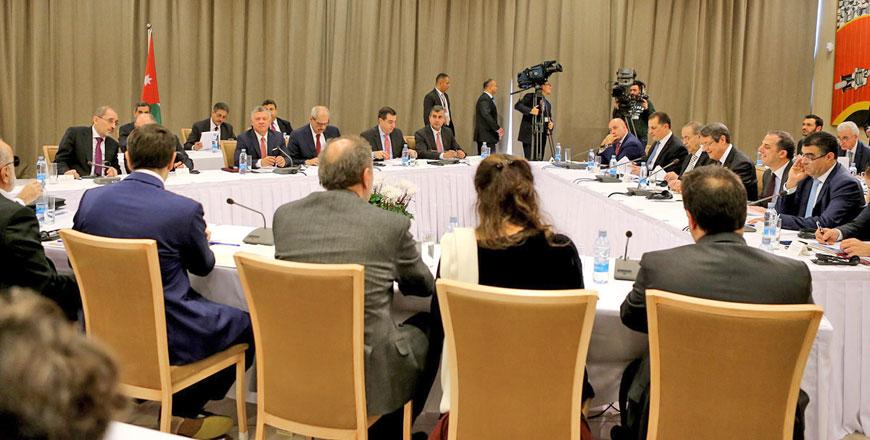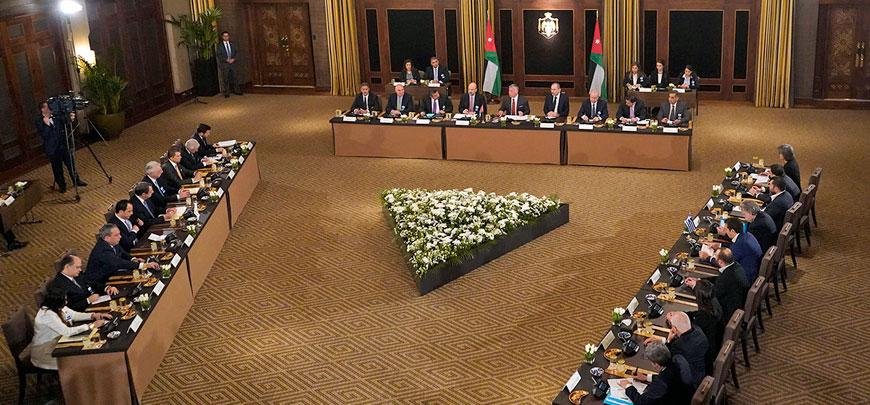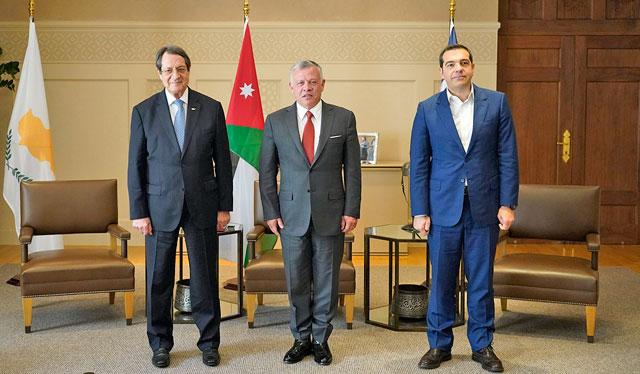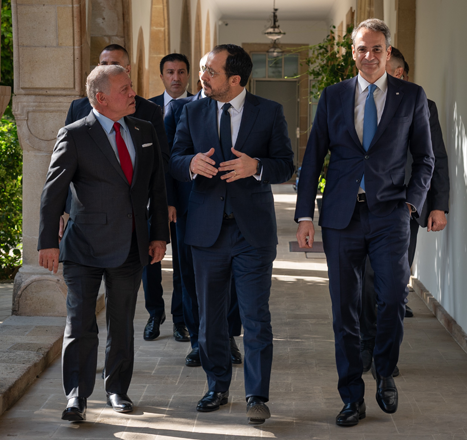You are here
‘We are ready to expand, deepen and enrich this partnership’
By JT - Jan 16,2018 - Last updated at Jan 16,2018

His Majesty King Abdullah hold talks with Cypriot President Nicos Anastasiades and Greek Prime Minister Alexis Tsipras in Nicosia on Tuesday (Photo courtesy of Royal Court)
Full text of Cyprus-Greece-Jordan First Trilateral Summit Declaration
AMMAN — Following a three-way summit between His Majesty King Abdullah and Cypriot President Nicos Anastasiades and Greek Prime Minister Alexis Tsipras, the three countries issued the following communiqué, released by the Royal Court:
We, Nicos Anastasiades, President of the Republic of Cyprus, His Majesty King Abdullah II Ibn Al Hussein of the Hashemite Kingdom of Jordan, and Alexis Tsipras, Prime Minister of the Hellenic Republic, having met in Nicosia today, January 16, 2018, have decided to establish a trilateral partnership and have agreed on its guiding principles. Our partnership is not exclusionary, nor directed against any country. It is established on the basis of full respect of international law and of the purposes and principles enshrined in the Charter of the United Nations, the UN Security Council Resolutions, including commitment to good neighbourly relations, international peace and security and respect for the sovereignty, independence and territorial integrity of states.
Today, during our first summit, we have expressed our commitment to lay the groundwork for the strengthening of the cooperation between our three countries in many areas of common interest. It is a dynamic and not a static process. We are ready to expand, deepen and enrich this partnership that will reach out not only to the public sector, but also to the private sector, other interested stakeholders and our societies as a whole.
Cognizant of the multifaceted challenges in the wider region that demand closer cooperation at the regional and international level, we are convinced that this partnership between our countries, which share the same values, principles and vision for the future of our region, will serve the common goal of contributing to peace, security, stability and prosperity. Today’s summit provided us with the opportunity to discuss and share thoughts on the complexities of both our immediate and wider neighbourhood.
We reiterate our support for a comprehensive, just, negotiated and lasting settlement of the Palestinian-Israeli conflict based on the two-state solution and in accordance with international law, relevant UN resolutions and the Arab Peace Initiative. We maintain our common position that the status of Jerusalem, the holy city of the three monotheistic faiths, must be determined within the framework of a comprehensive solution to the Palestinian-Israeli conflict that guarantees the establishment of an independent Palestinian state on pre-June 1967 lines, with East Jerusalem as its capital living side by side with Israel. We appreciate and recognise the highly constructive and important contribution of Jordan in the Middle East Peace Process and the efforts of His Majesty King Abdullah II Ibn Al Hussein, the Custodian of Islamic and Christian holy sites in Jerusalem, in safeguarding the city’s holy sites and preserving the legal and historical status-quo in Jerusalem.
We express our full support to the continuation of the negotiation process, under the Good Office Mission of the UN secretary general, for a just, comprehensive and viable settlement of the Cyprus problem, in line with international law, the principles upon which the European Union is founded and the relevant UN Security Council resolutions. We commend the efforts of the president and the government of the Republic of Cyprus to reach a solution that will reunify the island and safeguard Cyprus’ independence, sovereignty and territorial integrity. We underline that a comprehensive settlement would not only benefit the people of Cyprus, but also significantly contribute to the peace and stability of the region.
Jordan is at the frontline of the fight against terrorism and as such, we express wholehearted support to Jordan’s efforts to counter this phenomenon and especially to the important platform that His Majesty King Abdullah II Ibn Al Hussein Aqaba Process Initiative offers for discussions and consolidating the global front against terrorism. In this context, the three countries have and will continue to be active in taking initiatives towards that direction.We also note the 2nd Rhodes Informal Ministerial Conference for Security and Stability held in May 2017 as well as the Youth Cooperation for Peace: Building bridges to counter radicalisation and extremism, that took place in Nicosia in December 2017.
We recognise that the effective management of the large numbers of refugees, a direct consequence of the conflicts in the region and especially the war in Syria, will only be possible with the achievement of a political solution. At the same time, we emphasise the need to implement the basic principles of solidarity and support to the countries which have been called upon to play a major role through receiving vast numbers of refugees and through addressing the severe humanitarian consequences. This is a challenge for humanity. The international community collectively, and all countries individually, should assume their responsibilities; more importantly to follow through on their commitments.
In this context, we reiterate the need for the EU to support Jordan with regard to the burdens and challenges related to hosting over 1.3 million Syrian refugees. We also underline the crucial role of Greece with regard to the reception and accommodation of the refugees and appreciated the humane treatment of the refugees in the countries.
We attach significant importance to EU-Jordan relations and express our satisfaction with the clear common desire to strengthen this mutually beneficial partnership. To this end, we are committed to facilitating further enhancement of this cooperation at all levels. We look forward to the implementation of the EU-Jordan Partnership Priorities 2016-2018, including the EU-Jordan Compact, within the framework of the Association Agreement and the new European Neighbourhood Policy. We are convinced that closer cooperation throughout the entire spectrum of EU-Jordan relations will improve our capacity to address the challenges to regional stability and security and bolster our ability to counter terrorism and violent extremism.
We underline the importance of the Euro-Mediterranean cooperation and highly value the role of the Union for the Mediterranean (UfM). Under joint EU-Jordan chairmanship, the UfM has gained traction in promoting the common interests of the countries of the region.
We express our support for the unity, territorial integrity, sovereignty and independence of Syria and the efforts to achieve a Syrian-led political solution in accordance with UN Security Council Resolution 2254, that will ensure the stability of the country. We extend our full support to the UN and Arab League envoy to Syria, Staffan de Mistura, and his efforts in the framework of the Geneva process.
We express our support to the unity, sovereignty and territorial integrity of Iraq. Though we welcome the declaration of the successful end of the war against Daesh, we are fully aware that liberation does not mean that the fight against terrorism is over. Efforts should now focus on rebuilding the country in an inclusive manner in the interest of all Iraqis. All outstanding issues should be resolved by Iraqis themselves through peaceful and constructive dialogue, in accordance with the provisions of the Iraqi constitution. All parties within Iraq, as well as regional actors, should exercise restraint and avoid unilateral actions.
We have also agreed to inaugurate our trilateral cooperation in a wide range of areas of common interest and to examine practical means to encourage synergies involving both the public and the private sector. Further to the preparatory work already accomplished, and the results of the two preparatory trilateral meetings at the level of secretaries general/permanent secretary of the ministries of foreign affairs, held in Nicosia (2016) and Athens (2017), we have formulated joint proposals initially in the following fields: renewable energy resources and energy efficiency, management of water resources, agriculture, aquaculture, tourism, transport and merchant shipping, protection of antiquities and health. We welcome and endorse the working document prepared by our respective authorities which identifies the specific areas of cooperation within the aforementioned fields. This list is by no means exhaustive and our competent authorities are mandated to work closely in order to explore opportunities for cooperation in other fields and areas of common interest.
Increasing energy efficiency and the use of renewable energy sources is an environmental and strategic target in our countries. We acknowledge the importance of reducing the consequences of global warming and climate change, thereby ensuring a sustainable energy future for our economies, our societies and the environment. In this regard, we express our determination to strengthen our collaboration, in particular in the fields of energy efficiency and renewable energy technologies, including the crucial issue of financing and securing investments. As a practical expression of this determination, today we have signed a memorandum of understanding (MoU) on renewable energy resources which establishes the ground and the direction of our cooperation in this strategic field. We are particularly keen to encourage joint projects regarding the use of solar energy.
Dealing with water scarcity constitutes a high priority issue at national or local level in our countries. Taking into account our common concerns and challenges regarding management of water resources we have agreed, as a first step, to focus our trilateral cooperation on developing and improving our infrastructure, exchanging of experiences and knowledge in the field of desalination and supporting research and capacity building. We also support and encourage cooperation in energy production from water, and recognise also the importance of wastewater treatment and reuse mainly in the agricultural sector.
In the field of agriculture, we aim at facilitating the production and promotion of high quality agricultural goods and the exchange of technical experiences in various agricultural fields. We will strengthen our cooperation in education, training programmes, research activities and innovation projects.
We have also agreed to cooperate in sharing technical know-how on new aquaculture systems and in the fields of education, training and research.
Given the importance of tourism for our economies and recognising the added value of a comprehensive trilateral cooperation, we are ready to explore every available channel that will allow us to capitalise the benefits of such cooperation. We will exchange knowledge and expertise, encourage synergies involving private and public stakeholders and support joint tourism projects that will boost the influx of tourists and revenues, promote and attract investments, expand and develop our product and increasingly improve the quality of our services.
We have also decided to strengthen our cooperation in the field of maritime transport particularly as regards inspection of vessels in accordance with relevant international conventions and MoUs to which each state is party to, “seafarers” training and certification issues and implementation of international maritime conventions adopted in the context of the International Maritime Organisation. We express satisfaction with today’s signing of arrangements between Cyprus and Jordan, and undertakings between Jordan and Greece, on mutual recognition of certificates of competency, and certificates of proficiency for seafarers, in accordance with respective provisions of the International Convention of Standards of Training, Certification and Watchkeeping for Seafarers, 1978, as amended.
We underline our commitment to the protection of antiquities and for the preservation and development of historical and archaeological sites, aiming at safeguarding and promoting the rich historical and cultural heritage of our region and the common heritage of mankind. This common goal is underscored by today’s signing of the Agreement on Prevention of Theft, Clandestine Excavation and Illicit Import, Export or Transfer of Ownership of Cultural Property and the Promotion of its Restitution. This comprehensive and inclusive document also contains provisions for training and exchanges, as well as joint research projects.
We also welcome the “Convention on Offences Related to Cultural Property”, the “Nicosia Convention”, which was opened for signature on May 19, 2017, in Nicosia, in the context of the Cyprus Chairmanship of the Committee of Ministers of the Council of Europe. We recognise its importance as the only international treaty specifically dealing with the criminalisation of the illicit trafficking of cultural property.
Exploring existing opportunities for strengthening cooperation on digital and communication technologies research and innovation projects is of strategic importance to the economic growth of our countries. In this context, our trilateral cooperation will contribute to developing clusters innovation capacity and enhancing coordination of information and communication technologies.
We have agreed to promote our cooperation in the critical health sector. Our collaboration will, inter alia, include exchange of experience and knowledge and training opportunities for health professionals. Particular emphasis will be given to cooperation in the field of prevention and responding to diseases and disasters. At the same time, we will seek to tackle the healthcare challenges related to the migrant-refugee issue.
We agree that this trilateral mechanism is not static, but will evolve in both its depth and scope. In order to facilitate this undertaking, we have tasked the ministries of foreign affairs with overseeing and coordinating the implementation of the proposals we have endorsed today and future cooperation, through a trilateral steering committee.
We are convinced that our trilateral cooperation will benefit our countries, our peoples and the wider region. We are determined to fully engage the synergies that will contribute to realising its full potential. This inaugural trilateral summit paves the way for the further development of our partnership, which we firmly believe contributes, in its own way, to peace, security, stability and the prosperity of our region.
We have agreed to convene the second trilateral summit in Jordan.
Related Articles
Following is the full text of the declaration released at the conclusion of the Jordan-Cyprus-Greece second trilateral summit on Sunday:“We,
AMMAN — His Majesty King Abdullah, Cypriot President Nicos Anastasiades and Greek Prime Minister Alexis Tsipras agreed during their trilater

















